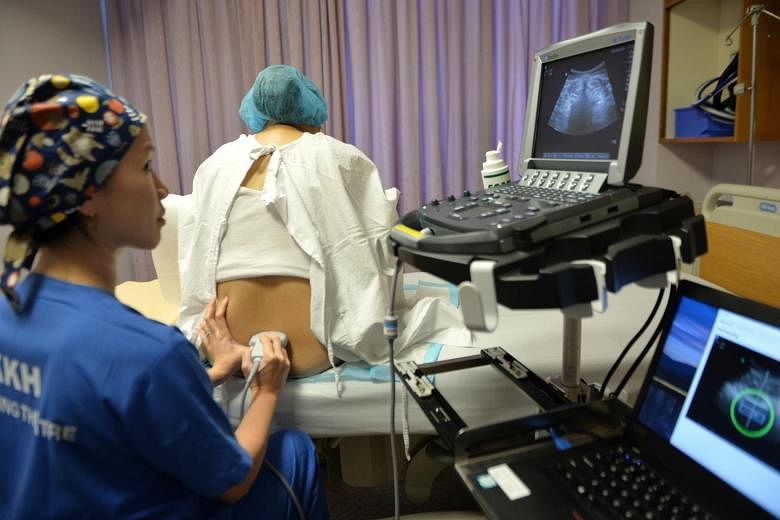SINGAPORE - Women during childbirth often have to bear the repeated needle jabs while receiving spinal anaesthesia and risk complications such as nerve injury.
But a new artificial intelligence-powered method is set to reduce their pain and risks by improving the rate of accuracy of administering spinal anaesthesia at the right spot and right angle on the first try.
Spinal anaesthesia procedures involve delivering local anaesthetics into a fluid space surrounding the spinal canal.
The new AI-powered system, uSINE, helps reduce the patients' risk of complications which include prickling sensations on the skin and, in rare cases, nerve injury and paralysis.
Developed as part of a study conducted by KK Women's and Children's Hospital (KKH) and the Faculty of Engineering at the National University of Singapore (NUS), the uSINE software automatically detects the optimal level for doctors to insert the spinal needle with precision, reducing the number of attempts on the patient.
About $360,000 was used to fund the overall study, which began in 2013.
Currently, doctors use ultrasound scans and palpation-based technique, relying on touching the area on the body to determine the spot for the needle insertion.
Between May 2016 and May 2017, KKH led a clinical study involving 100 woman undergoing spinal anaesthesia to evaluate the first attempt success rate of the spinal anaesthesia procedure with the use of uSINE.
Results showed that doctors in the study were able to achieve a first attempt success rate of 92 per cent using the software, far higher than the global first attempt success rate of 50 to 60 per cent.
Associate Professor Sng Ban Leong, senior author of the published study, said the patients in the clinical study were open to the use of the AI-powered system, which could enable KKH to improve the care for patients undergoing spinal anaesthesia procedures.
The procedure is used for surgeries such as caesarean section deliveries and some gynaecological surgery such as vaginal hysterectomies.
A total of 2,500 spinal anaesthesia procedures are conducted on women undergoing caesarean section deliveries each year at KKH.
Prof Sng, who is head and senior consultant of the Department of Women's Anaesthesia at the hospital, said the software would also train doctors specialising in anaesthesia to better identify correct spinal landmarks.
"uSINE not only reduced the anxiety, discomfort and pain associated with multiple needle insertions, it also reduces the complications associated with it," he said.
The study team is looking to further enhance the system and investigate its use in high-risk patients, such as patients with abnormal spine, those who have undergone spinal surgery and obese patients.
The system has been licensed to NUS spin-off company, HiCura Medical, for commercialisation, and efforts are under way to introduce it into clinical care.


